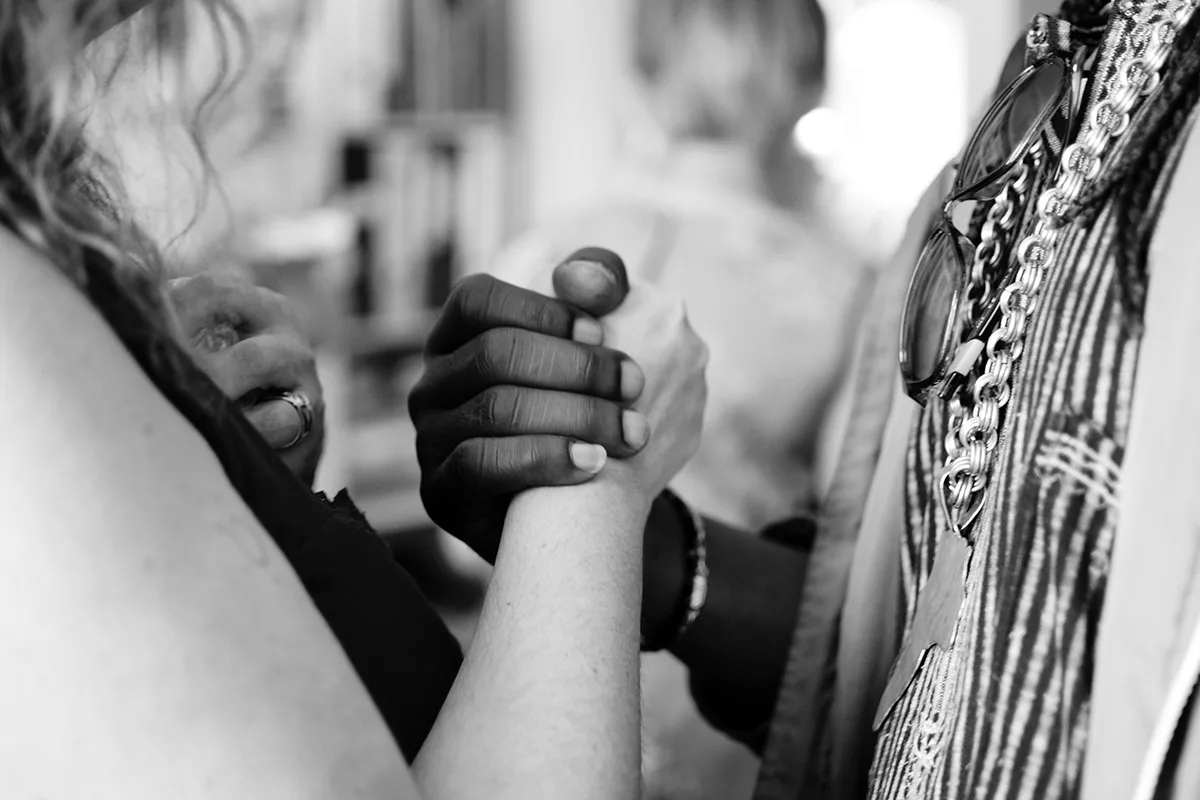Creating workplaces that support diversity, inclusion, and belonging requires leaders to lean into discomfort, embrace a different mindset, lead with heart, and instill safety and trust in their communications and behaviors throughout the organization. One pathway forward toward creating a culture of belonging is to empower allies at work.
What is an ally? An ally is someone who is not a member of an underrepresented group but who holds positions of privilege and power, and who can advocate and take action to support less represented groups. Allyship is incredibly important so that everyone and their contributions are not only invited to the table at work but also heard and acknowledged.
As women and other minority groups have become painfully aware, the most dominant and powerful group in the workplace and the world are men. A new era of conscious leadership and business is being born, and in order to come together to solve the complex problems we have at work and in the world, it will require men to be allies. This means male leaders will need to use their privilege, social capital, and influence to rally, sponsor, and become allies with and for women, people of color, LGBTQ groups, and nonbinary gender groups.
My journey into really understanding the hearts and minds of men in 2019 came earlier this year when I had the privilege of attending the Better Man Conference in San Francisco. Conference attendees included 200 men and 15 to 20 women. I have been supporting cultures of belonging for years in my work as a leadership consultant and supporting cultural transformation at work. The topic of allyship was familiar to me, but I had never heard the experiences and vulnerability of so many men and male leaders before.
At the beginning of the day at the conference, the term “man box” came up. The “man box” is a term that defines what is acceptable behavior for a man through the eyes of society, which involves the experiences and the messages men receive from others. Gender is normalized through culture, context, structures, and interactions. Men are supposed to be dominant, fearless, strong, powerful, successful, and emotionless. In short, the “man box” perpetuates the heterosexual norms that don’t conform to a gender binary. After the conference, I wanted to dig deeper into this issue of allyship and how it might relate to the “man box.”
Earlier this year, I interviewed Mark Greene on podcast SHINE — Leading Consciously at Work and the World about healing #MeToo. Greene is an expert at understanding the emotional suppression of men that leads to violence, the author of “The Little #MeToo Book for Men,” and founder of Remaking Manhood. Greene believes that the “man box” is directly tied to privilege, patriarchy, and the good-old-boys club. It is at the root of the glass ceiling and the backlash against women’s rights. Greene is using his voice and knowledge on these topics to inspire and support a new version of manhood.
Both at the conference and in my research, I discovered that there are men who want to get out of the “man box” and often feel disgusted when they conform to these “man box” behaviors. One of these men is Vince Guglielmetti, Intel’s Vice President of Americas General Manufacturing Operations General Manager. Guglielmetti has been part of Intel’s Male Allyship program. Men advocating for real change (MARC) is a program for male allies started by women leaders at their Costa Rica Intel site. To become part of the male ally MARC program you have to be sponsored by someone.
What does it look like to be a male ally at work? I got my answer when I had an opportunity to speak with Guglielmetti one-on-one in an interview on this topic for the research in my upcoming book and on my podcast. He shared that he defines male allies as members of an advantaged group committed to building relationships with women, expressing as little sexism in their own behavior as possible, understanding the social privilege conferred by their gender, and demonstrating active efforts to address gender inequities at work and in society.
Guglielmetti often says, “I am my mother’s son.” He feels his characteristics are a balance of masculine and feminine qualities. Guglielmetti told me that he has watched more dominant men talk over him and other men at work and in the world numerous times. During our conversation, he said when he hears any person talking over another or mansplaining, he brings awareness to the behavior and challenges the person directly. He said that many men have decided to be allies because they have been positively impacted by a woman in their life.
When I asked Guglielmetti what day-to-day male allyship looks like, he told me that he opens team meetings with an awareness of his language, specifically the terms he chooses so that he invites a more inclusive tone that provides a safe atmosphere for everyone to contribute and be heard. For example, if you open a meeting with, “Hey, guys” but there’s a mix of many genders, this leaves many in the room feeling marginalized. As a male ally, he does his best to create safe spaces so that real conversations can happen and everyone can bring their whole and best self to work.
Part of being a male ally is about challenging microaggressions, and going after other male leaders to inspire and enroll them into male allyship where they can lend their voice to others. Guglielmetti told me that he will often state to women and LGBTQ people, “How can I be your voice? I know you need my voice; how can I be your voice?” He also always assesses and educates himself on topics and issues related to women, people of color, and LGBTQ. For example, Guglielmetti told me that the book “Lean In” by Sheryl Sandberg had a big impact on him. I felt touched and inspired hearing about his conscious leadership and inclusion, and I feel excited to see the wonderful impact this will have on Intel’s culture and hope it will influence other companies and men to step forward as allies.
Intel also launched an initiative called Ally Nation, a global program to enlist employees and managers as allies to support a more inclusive work environment, helping them understand and role-model inclusive behaviors.
Guglielmetti is one example of a male leader committed to being an ally. I want to highlight another bright light, Marc Benioff, CEO of Salesforce. When Benioff began Salesforce in 1999 he made his motivations clear by outlining an agenda that looked beyond shareholders’ needs and included people and planet (versus just profits). One of Benioff’s greatest values as a leader is trust and transparency. In 2015, when Indiana passed a bill that would allow companies to deny service to LGBT customers, Benioff took a brave stand and threatened to withdraw his company’s investment in the state and encouraged other tech CEOs to help fight the bill. Indiana quickly revised the law that would deny service to customers based on their sexual orientation or identity.
In 2016, Salesforce bought 13 companies including e-commerce platform Demandware, word processing app Quip, messaging startup HeyWire, and Steelbrick, a company with software for sales reps. These employees are now under the Salesforce umbrella, but their salaries were not included in an earlier analysis that the company used to erase unequal pay. Salesforce did a seven-year retro-pay and pledged to review its gender pay gap on an ongoing basis to be monitored and discharged from year to year. As a result, Salesforce has spent $8.7 million in salary adjustments for 30,000 global employees. These actions demonstrate Benioff being a strong male ally, walking his talk, being his word, and placing the interests of society above profits and these actions instill trust and belonging. As a result, Benioff has consistently scored above 90 percent in CEO approval ratings since 2013 on Glassdoor, where the average approval rating is 69 percent.
To create greater belonging at work, it begins with trust. When we see leaders showing up with vulnerability, authenticity, and integrity time and again, it creates trust. More than that, it deeply affects the fabric of society. If we can’t trust other people, we’ll avoid interacting with them, which will make it hard to build anything, solve problems, or innovate.
Qualities that support allyship
How do we lead the change? It begins by having more people willing to stand up and lend a voice for the marginalized.
How do you begin a male allyship program in your workplace?
A male allyship program normally starts with a very small group of men who are attending the women’s Employee Resource Group (ERG) events. These men have decided that they want to be an ally and therefore show up in support of these groups run by women in the organization. My friend Dale Thomas Vaughn, co-organizer of the Better Man Conference, spoke about the ally journey for men. Dale told me that, in his experience, once men begin to attend these ERG groups, the women in the ERG groups are normally very forgiving of men and invite them to attend and support them. However, women inviting men in is not without risk and the willingness to shift the narrative of the past grievances that women and less dominant groups have experienced by men at work. Women are not going to teach men how to be this more evolved version of masculinity and leadership, but there are programs like the MARC and the Better Man Conference that will. In most organizations, women are the leaders of allyship and often the most inclusive leaders in our world right now.
What we have been learning in this article is about the “man box” culture, allyship, the importance of challenging the status quo, and encouraging conversations that support belonging. Having a diverse workforce is a critical factor in improving not just the quality of a company’s leadership and decision making, but also its overall financial, environmental, social, and governance performance, and ultimately, the company’s sustainability. Companies like Credit Suisse, McKinsey, and Catalyst have shown that the presence of women at top levels of management and leadership has been correlated with better financial performance for the company. Notably, too, companies with more women on their board of directors are more likely to be invested in sustainable operations and missions.
The science is clear when evaluating the key predictors of good leadership: women tend to outperform men. Why? They lead more transformationally. In a research study, women were rated as excelling in taking initiative, acting with resilience, practicing self-development, monitoring others performance, giving them unbiased critical and constructive feedback and empathizing with others, driving for results, and displaying high integrity and honesty. In fact, they were thought to be more effective in 84 percent of the competencies that we most frequently measure. Women are also less likely to lead in a passive way, which is very ineffective as a leader. Men are more likely to stay silent in leadership than women. Additionally, numerous studies have demonstrated that, as MBA students, employees, consumers, and investors, women are more aligned with and desirous of corporate sustainability.
However, based on the January 2019 S&P 500 list, women currently hold 27 (5.4 percent) of CEO positions at those S&P 500 companies. How can we advocate for women and less dominant groups so they can influence business to be more financially, socially, and environmentally sustainable? We need to enroll male allies.
Without the avid support of men, significant progress toward ending gender disparities is unlikely. What’s at stake? A study by McKinsey projects that in a “full potential” scenario in which women participate in the economy identically to men, $28 trillion dollars (26 percent) would be added to the annual global GDP when compared to the current business-as-usual scenario. When men and women can lead consciously at the top at work and in the world, I feel strongly that then and only then will we able to solve some of the larger problems facing us in this next decade. We can start this new paradigm of leadership and business today.
How to enroll male allies
- Raise our expectations about education and inclusion, so there can be a deeper relationship and conversation.
- Invite men to attend discussions and events around gender equity in the workplace so that efforts on inclusion, diversity, and belonging are more successful.
- Encourage and facilitate more positive interactions with men. The research shows the more positive interaction men have with women in professional settings, the less prejudice and exclusion they tend to demonstrate.
- Give men an important role to play in gender parity efforts. The motivation for this role can often be tied to personal examples and a sense of fairness and justice.
- Cultivate supportive partnerships with women and less dominant groups. Ask how can you support them. You might share your social capital with information, knowledge, and/or your influence with organizational resources or invitations.
- Raise your awareness on where you are in your own biases. Go to the Harvard Project Implicit Bias Test.
Being an inclusive leader means being comfortable with discomfort. Be willing to enhance your self awareness, compassion, and empathy so that you can create more belonging. The most important part of being an ally is your willingness to try and fall new ways of speaking and interacting at work. You won’t be perfect, but if your motivation is to help, it is better to speak up then to be silent. Change happens at the speed of trust. There is no safety or belonging without real connection, empathy, understanding or vulnerability
To learn more about this powerful conversation I have with Guglielmetti and many other conscious leaders and businesses wanting to be a force for good in the world, go to leadfromlight.com. Here you will get access to my upcoming program From Burnout to Breakthrough, and be subscribed to the SHINE podcast.







